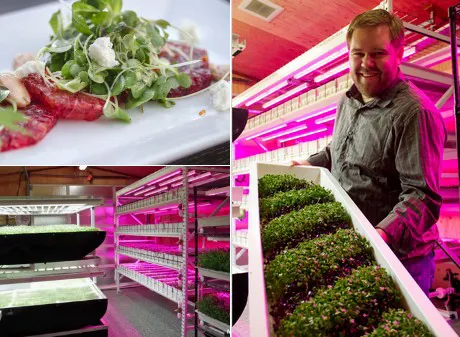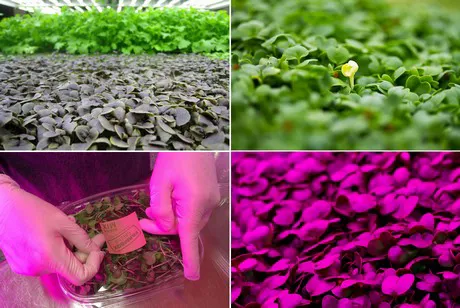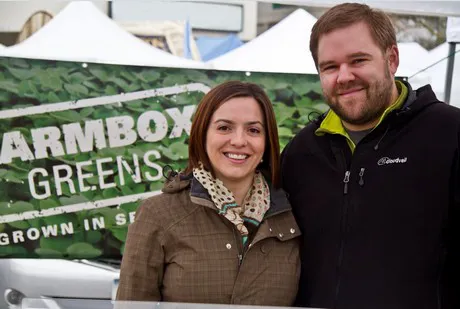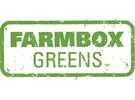
Albert's garage is the heart of Farmbox Greens. He started with growing the leafy greens in there after he saw that there was a shortage of fresh supply in his area.
Local
“While there were microgreens on the market, the quality was not satisfying in most cases, as they had to come from far away. We realized that we had a good chance of success if we could produce culinary herbs and microgreens within short reach from the end user."The urban farmer explained that he knew that fresh and local means everything. "Especially in the wintertime, when all of the produce comes from across the border or from Southern California. Producing locally would make sense, as we were convinced that there was a market for fresher and better tasting products."
Why vertical?
With his background as an ecological designer, Albert soon decided that he would start producing in an indoor farm, and not in an open field or in a greenhouse setting. Albert knew that it would be more sustainable and efficient to start producing in a controlled environment; he wanted to grow with less water, fertilizers and minimal disease pressure, plus a more consistent production, year round."In my former job at an architecture company, I learned about vertical farming and urban agriculture through my interest in sustainable design. We started to think about the concept of producing food in or on buildings. At that time, vertical and urban farming wasn't as prevalent as it is today, but I soon became involved and a part of the movement that created the idea behind the vertical farming industry.
Albert laid the foundation for prototypes and R&D projects with several companies and suppliers of vertical farming technologies. “We decided to set up a system in a really tiny office space and learned the basics on how to grow. Eventually we figured out how to grow consistently enough that we decided to see if we could sell it to a local restaurant."

Garage
It started as a small trial with just a few customers, but within a short time Albert had more customers demanding his fresh and locally grown greens. "We realized when we ran out of growing space that the small trial was not large enough to meet the demand. Around that same time my wife and I were looking for a new house and found one with a relatively large garage that was perfect for a larger production of crops."The system that Albert installed in his garage is all self made. It's a very simple setup made with off the shelf technology. The multilayer bench system has a modified nutrient film irrigation system and every layer is equipped with white or integrated spectrum LED lights. All the irrigation and temperature is controlled with simple technology. Albert doesn't need any additional heating in the grow room, as enough heat comes from the lights; only a cooling system kicks on and off to maintain the right temperature.
"We could have installed very fancy and sophisticated technology, but that would have been a large investment if you consider that we only grow in a very small setting. The setup that we use right now does the job perfectly. I believe that it's not about how big or fancy the tractor is, it's about how you use it. And we achieve optimal results with ours."
Clockwork
Albert explained that his growing system is almost like 'set it and forget it'. "The process that we have established means that we harvest almost every day. It works like clockwork, it's a very programmable cycle. If you keep the plants happy, you can time everything. Obviously you will have fluctuations in the nutrient system that can slow down or speed up things, but generally we are able to keep a very consistent schedule. Because it's a closed environment that is completely controllable, which allows us to dial in production to minimize waste while meeting demand. This also means that we can harvest according to our customers' wishes, guaranteeing that we deliver the product within hours after harvest. Our microgreens arrive fresher, and tastier."Tell the story
Farmbox Greens customers appreciate the sustainable production methods. At farmers markets they tell their story to consumers by explaining that the microgreens are grown in a closed environment. Consumers get to know that no pesticides are required as harmful pests have no access to the production, less water is used as irrigation water is recirculated, and the crops are grown without exhausting the earth's soil. "It's important to get that story out there," said Albert.
Dan Albert and his wife Linday Sidlauskas
Resilience
But now that Farmbox Greens is serving such a large group of chefs, restaurants and grocery stores, would it not make sense to scale up the production? "We had the opportunity to take on investors early on in our business and expand the operations. But the slow process of building the farm, learning from our mistakes and adding one customer at a time has really added to the resilience of the business. We now have a pretty diverse customer base, and have established strong relationships because we can deliver what we say we’re going to deliver. While we continue to take on new customers all the time, we are very intentional about our growth as a business. And at the moment we are happy with what we are doing, but who knows where the future will take us."For more information:
Farmbox Greens
 West Seattle, Washington USA
West Seattle, Washington USAinfo@farmboxgreens.com
www.farmboxgreens.com
www.faceboox.com/farmbox
www.instagram.com/farmboxgreens
